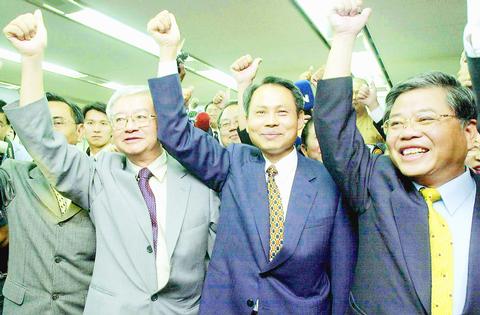Members of the Taiwan Solidarity Union handed in their application for party registration yesterday at the Ministry of the Interior, moving one step closer to officially becoming a party.
But no sooner had they done so than the DPP's chairman and the new party's spokesman began trading barbs.
The new party, established with the help of former president and KMT party chairman Lee Teng-hui (

PHOTO: CHIANG YING-YING, TAIPEI TIMES
Its entry into the year-end elections, however, has made all three of Taiwan's major parties, including the ruling DPP, extremely nervous.
When asked to comment on the party's formation yesterday, Frank Hsieh (
"They are nominated just because they want to run in the elections, but that doesn't mean they have a voter base. I hope that results of the election won't have any negative influence on Lee's prestige," Hsieh said.
In their defense, the new political group's official spokesman, Su Chin-chiang (蘇進強), said that the party's candidates did indeed have the public support needed to be elected.
"We've evaluated nominations for each candidate based on their personal image, capability, profession, background, and their voter bases. The other parties are nervous about facing us. If DPP candidates' are competitive enough, they shouldn't worry about us," Su said.
After handing in its application yesterday, the party still needs to host a political gathering to be officially registered, according to the Law for People's Groups. At least 30 individuals as well as civil affairs officials need to be in attendance at the gathering.
The party currently is expected to have a membership of up to 50 members, most of whom plan to run in the year-end elections.
Party regulations and names of individuals who are in charge of the party must also be submitted to the government before the party can be officially established and then able to nominate its own candidates for the elections.
The party will hold its debut conference on Aug. 12, and is planning to invite president Chen Shui-bian (陳水扁), the DPP's Chairman Frank Hsieh, the KMT's Chairman Lien Chan (連戰) and the PFP's Chairman James Soong (宋楚瑜).
Lee Teng-hui is also expected to attend the conference. The party will release a complete nomination list for the legislative elections during the conference.

MAKING WAVES: China’s maritime militia could become a nontraditional threat in war, clogging up shipping lanes to prevent US or Japanese intervention, a report said About 1,900 Chinese ships flying flags of convenience and fishing vessels that participated in China’s military exercises around Taiwan last month and in January last year have been listed for monitoring, Coast Guard Administration (CGA) Deputy Director-General Hsieh Ching-chin (謝慶欽) said yesterday. Following amendments to the Commercial Port Act (商港法) and the Law of Ships (船舶法) last month, the CGA can designate possible berthing areas or deny ports of call for vessels suspected of loitering around areas where undersea cables can be accessed, Oceans Affairs Council Minister Kuan Bi-ling (管碧玲) said. The list of suspected ships, originally 300, had risen to about

DAREDEVIL: Honnold said it had always been a dream of his to climb Taipei 101, while a Netflix producer said the skyscraper was ‘a real icon of this country’ US climber Alex Honnold yesterday took on Taiwan’s tallest building, becoming the first person to scale Taipei 101 without a rope, harness or safety net. Hundreds of spectators gathered at the base of the 101-story skyscraper to watch Honnold, 40, embark on his daredevil feat, which was also broadcast live on Netflix. Dressed in a red T-shirt and yellow custom-made climbing shoes, Honnold swiftly moved up the southeast face of the glass and steel building. At one point, he stepped onto a platform midway up to wave down at fans and onlookers who were taking photos. People watching from inside

Japan’s strategic alliance with the US would collapse if Tokyo were to turn away from a conflict in Taiwan, Japanese Prime Minister Sanae Takaichi said yesterday, but distanced herself from previous comments that suggested a possible military response in such an event. Takaichi expressed her latest views on a nationally broadcast TV program late on Monday, where an opposition party leader criticized her for igniting tensions with China with the earlier remarks. Ties between Japan and China have sunk to the worst level in years after Takaichi said in November that a hypothetical Chinese attack on Taiwan could bring about a Japanese

The WHO ignored early COVID-19 warnings from Taiwan, US Deputy Secretary of Health and Human Services Jim O’Neill said on Friday, as part of justification for Washington withdrawing from the global health body. US Secretary of State Marco Rubio on Thursday said that the US was pulling out of the UN agency, as it failed to fulfill its responsibilities during the COVID-19 pandemic. The WHO “ignored early COVID warnings from Taiwan in 2019 by pretending Taiwan did not exist, O’Neill wrote on X on Friday, Taiwan time. “It ignored rigorous science and promoted lockdowns.” The US will “continue international coordination on infectious